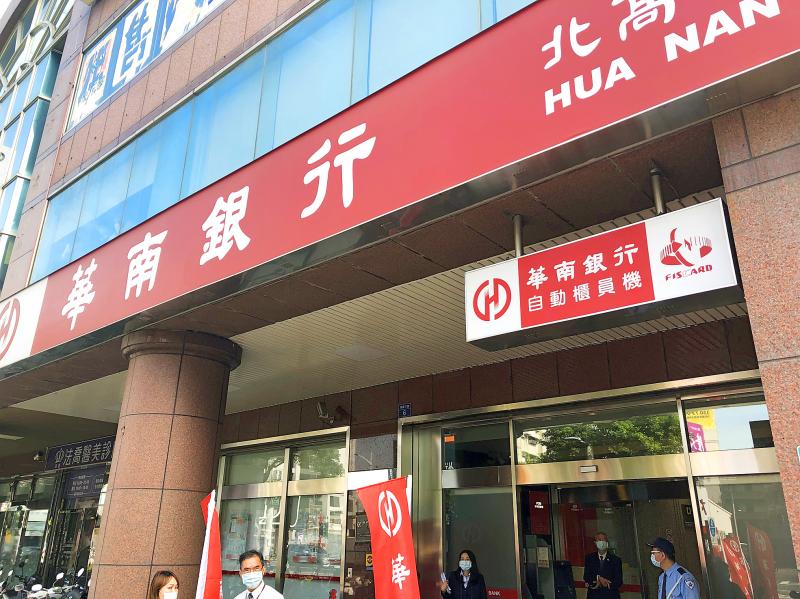State-run Hua Nan Commercial Bank (華南銀行) yesterday said that it is to recruit information technology personnel to meet development needs, as technology is reshaping the banking industry and it is stepping up digital transformation to stay competitive.
The century-old bank said it is in need of specialists in Java programming, software development, project management and systems integration training.
Nearly 70 percent of corporations have assigned more importance to information technology talent in the post-COVID-19 period, with the percentage reaching a high 86 percent among financial institutions, Hua Nan said, citing a survey of chief information officers by technology Web site iThome.

Photo: Kelson Wang, Taipei Times
Hua Nan welcomes jobseekers displaced or affected by the COVID-19 outbreak to join the company by following recruitment tips on its Web site and that of online recruitment agencies.
The lender’s information management business has three subdivisions that take charge of information security, information services, and information planning and development, it said.
New colleagues have the opportunity to sharpen their professional skills and knowhow on front-desk operations, back-
office efficiency enhancement, and cross-sectional coordination and integration, in line with their interests and strengths, it said.
To attract information technology talent, the lender said it has ditched its conventional seniority-focused promotion mechanism and replaced it with a system that values performance records and certificate accumulation.
Hua Nan said it has raised wages by at least 3 percent a year, with employees’ annual compensation averaging about 18.8 months of their monthly pay.

Macronix International Co (旺宏), the world’s biggest NOR flash memory supplier, yesterday said it would spend NT$22 billion (US$699.1 million) on capacity expansion this year to increase its production of mid-to-low-density memory chips as the world’s major memorychip suppliers are phasing out the market. The company said its planned capital expenditures are about 11 times higher than the NT$1.8 billion it spent on new facilities and equipment last year. A majority of this year’s outlay would be allocated to step up capacity of multi-level cell (MLC) NAND flash memory chips, which are used in embedded multimedia cards (eMMC), a managed

CULPRITS: Factors that affected the slip included falling global crude oil prices, wait-and-see consumer attitudes due to US tariffs and a different Lunar New Year holiday schedule Taiwan’s retail sales ended a nine-year growth streak last year, slipping 0.2 percent from a year earlier as uncertainty over US tariff policies affected demand for durable goods, data released on Friday by the Ministry of Economic Affairs showed. Last year’s retail sales totaled NT$4.84 trillion (US$153.27 billion), down about NT$9.5 billion, or 0.2 percent, from 2024. Despite the decline, the figure was still the second-highest annual sales total on record. Ministry statistics department deputy head Chen Yu-fang (陳玉芳) said sales of cars, motorcycles and related products, which accounted for 17.4 percent of total retail rales last year, fell NT$68.1 billion, or

In the wake of strong global demand for AI applications, Taiwan’s export-oriented economy accelerated with the composite index of economic indicators flashing the first “red” light in December for one year, indicating the economy is in booming mode, the National Development Council (NDC) said yesterday. Moreover, the index of leading indicators, which gauges the potential state of the economy over the next six months, also moved higher in December amid growing optimism over the outlook, the NDC said. In December, the index of economic indicators rose one point from a month earlier to 38, at the lower end of the “red” light.

The global server market is expected to grow 12.8 percent annually this year, with artificial intelligence (AI) servers projected to account for 16.5 percent, driven by continued investment in AI infrastructure by major cloud service providers (CSPs), market researcher TrendForce Corp (集邦科技) said yesterday. Global AI server shipments this year are expected to increase 28 percent year-on-year to more than 2.7 million units, driven by sustained demand from CSPs and government sovereign cloud projects, TrendForce analyst Frank Kung (龔明德) told the Taipei Times. Demand for GPU-based AI servers, including Nvidia Corp’s GB and Vera Rubin rack systems, is expected to remain high,